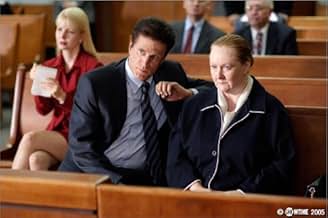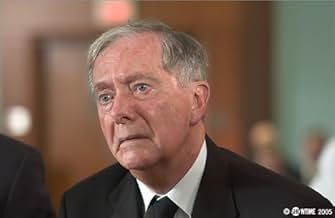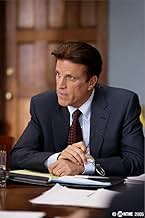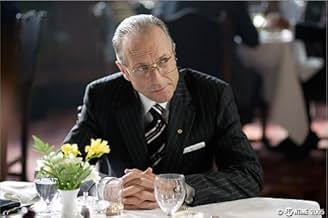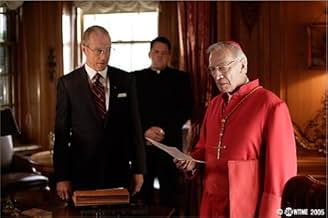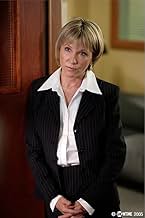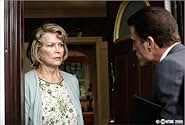Agrega una trama en tu idiomaA dramatized account of the hidden sexual abuse and scandal that shook the foundation of the Catholic Church, and the characters, events, and policies that brought the abuse and scandal into... Leer todoA dramatized account of the hidden sexual abuse and scandal that shook the foundation of the Catholic Church, and the characters, events, and policies that brought the abuse and scandal into existence.A dramatized account of the hidden sexual abuse and scandal that shook the foundation of the Catholic Church, and the characters, events, and policies that brought the abuse and scandal into existence.
- Dirección
- Guionistas
- Elenco
- Nominado a 2 premios Primetime Emmy
- 8 nominaciones en total
James Aaron Oliver
- Patrick McSorley
- (as James Oliver)
- Dirección
- Guionistas
- Todo el elenco y el equipo
- Producción, taquilla y más en IMDbPro
Opiniones destacadas
Much credit should go to David France and Thomas Michael Donnelly for the book and screenplay for "Our Fathers." The delicate subject matter of pedophilia in the Catholic church and the years of cover-up of the abuses in the hierarchy of the Boston diocese were handled with great sensitivity.
Every note of the film rang true, which was due in large part to the stellar cast. Christopher Plummer as Cardinal Law and Brian Dennehy as Father Spagnolia were both standouts. But the smaller roles were noteworthy as well, especially the adult men who were the abuse victims. The long-term effects of the abuse were vividly conveyed by those actors, who played their roles with great feeling and conviction. Ted Danson was very effective as an attorney motivated by the pursuit of justice, as opposed to greed. Even the actor who was faced with the daunting task of playing the late Pope John Paul II was highly credible. This brilliant ensemble was led skillfully under the sensitive direction of Dan Curtis.
This could have been a run-of-the-mill, lurid made-for-television film. Instead, it was an enterprise created with integrity by all of the artists involved.
Every note of the film rang true, which was due in large part to the stellar cast. Christopher Plummer as Cardinal Law and Brian Dennehy as Father Spagnolia were both standouts. But the smaller roles were noteworthy as well, especially the adult men who were the abuse victims. The long-term effects of the abuse were vividly conveyed by those actors, who played their roles with great feeling and conviction. Ted Danson was very effective as an attorney motivated by the pursuit of justice, as opposed to greed. Even the actor who was faced with the daunting task of playing the late Pope John Paul II was highly credible. This brilliant ensemble was led skillfully under the sensitive direction of Dan Curtis.
This could have been a run-of-the-mill, lurid made-for-television film. Instead, it was an enterprise created with integrity by all of the artists involved.
"Our Fathers", which is based on the book by David France, deserves an epic-size treatment of the sexual abuse of children by some clergy members within the Boston Archdiocese and the politics within the Catholic Church on this matter.
The movie is not as powerful as it could have been. That is not to say screenwriter Thomas Michael Donnelly and veteran director Dan Curtis (Dark Shadows, The Winds of War, War and Remembrance) totally failed. The scenes of abuse were handled with great sensitivity, they were not gratuitous or exploitive.
There are some very heartbreaking moments which include Ellen Burstyn as the mother of seven children who were all abused by one priest. Burstyn only appears in the film for only a few minutes but she makes the most of her scenes. (Update: If the group that awards the Emmys wanted to nominate a short but powerful performance by Burstyn, it should have been this one not the 14 second performance in Mrs. Harris. But I digress.)
Also of note, Chris Bauer who plays Olan Horne, one of the victims. He has a scene in which he is taunted by a couple of insensitive men at a local deli. When he graphically describes to them how he was abused, I was almost in tears. Bauer was a standout.
Christopher Plummer does a good job playing Cardinal Bernard Law. It would have been very easy to play him as a caricature (which, in my opinion, is what happened with the actors who portrayed the young and adult Fr. Geoghan) and Plummer somehow gave him some sympathetic qualities which made him a bit more complex.
My main issue with the movie was the decision by the screenwriter and the director to put so much weight on the legal aspects of the case and the news media's part of reporting the story. It does not mean that those aspects of the story should be ignored. Perhaps it had more to do with the source material. Author David France covered the crisis when he was a senior editor at Newsweek.
Because of this, despite some good scenes, I thought Ted Danson performance as Mitchell Garabedian was problematic. I was unable to connect with his character because I was paying more attention to the victims and the clergy. To me, Garabedian is a secondary character who was placed in a lead role. Also, I was very unimpressed with the scenes involving the reporters at the Boston Globe. It felt like a poor imitation of "All The President's Men".
There should have been more stories about the adult victims and their families and how these abuses affected their lives. I wished they would have delved more into the politics of the Catholic Church and why the church failed the victims and the reactions of parishioners and how their faith was shaken by this controversy.
I also believe that if the movie was performed chronologically and not used flashbacks, it would have been even more powerful and effective. While watching "Our Fathers", I kept thinking about the landmark, two-part film "The Boys of St. Vincent" (1992 and 1993), which told the true story of the sexual abuse of children at a orphanage in Newfoundland, Canada. The orphanage was run by a religious community. The movies also showed how it affected the victims, their families and the abusers 15 years later.
Also, I found Brian Dennehy's performance as Father Dominic Spagnolia, the clergyman who publicly criticized Cardinal Law and the Boston Archdiocese's handling of the sexual abuse claims but also had skeletons in his own closet, fiercely charismatic and totally fearless. Dennehy has been one of my favorite actors and when he sinks his teeth into a role, watch out. However, I believe the story of Father Spagnolia deserves a movie of its own.
Overall, "Our Fathers" was well-intended but not totally successful.
The movie is not as powerful as it could have been. That is not to say screenwriter Thomas Michael Donnelly and veteran director Dan Curtis (Dark Shadows, The Winds of War, War and Remembrance) totally failed. The scenes of abuse were handled with great sensitivity, they were not gratuitous or exploitive.
There are some very heartbreaking moments which include Ellen Burstyn as the mother of seven children who were all abused by one priest. Burstyn only appears in the film for only a few minutes but she makes the most of her scenes. (Update: If the group that awards the Emmys wanted to nominate a short but powerful performance by Burstyn, it should have been this one not the 14 second performance in Mrs. Harris. But I digress.)
Also of note, Chris Bauer who plays Olan Horne, one of the victims. He has a scene in which he is taunted by a couple of insensitive men at a local deli. When he graphically describes to them how he was abused, I was almost in tears. Bauer was a standout.
Christopher Plummer does a good job playing Cardinal Bernard Law. It would have been very easy to play him as a caricature (which, in my opinion, is what happened with the actors who portrayed the young and adult Fr. Geoghan) and Plummer somehow gave him some sympathetic qualities which made him a bit more complex.
My main issue with the movie was the decision by the screenwriter and the director to put so much weight on the legal aspects of the case and the news media's part of reporting the story. It does not mean that those aspects of the story should be ignored. Perhaps it had more to do with the source material. Author David France covered the crisis when he was a senior editor at Newsweek.
Because of this, despite some good scenes, I thought Ted Danson performance as Mitchell Garabedian was problematic. I was unable to connect with his character because I was paying more attention to the victims and the clergy. To me, Garabedian is a secondary character who was placed in a lead role. Also, I was very unimpressed with the scenes involving the reporters at the Boston Globe. It felt like a poor imitation of "All The President's Men".
There should have been more stories about the adult victims and their families and how these abuses affected their lives. I wished they would have delved more into the politics of the Catholic Church and why the church failed the victims and the reactions of parishioners and how their faith was shaken by this controversy.
I also believe that if the movie was performed chronologically and not used flashbacks, it would have been even more powerful and effective. While watching "Our Fathers", I kept thinking about the landmark, two-part film "The Boys of St. Vincent" (1992 and 1993), which told the true story of the sexual abuse of children at a orphanage in Newfoundland, Canada. The orphanage was run by a religious community. The movies also showed how it affected the victims, their families and the abusers 15 years later.
Also, I found Brian Dennehy's performance as Father Dominic Spagnolia, the clergyman who publicly criticized Cardinal Law and the Boston Archdiocese's handling of the sexual abuse claims but also had skeletons in his own closet, fiercely charismatic and totally fearless. Dennehy has been one of my favorite actors and when he sinks his teeth into a role, watch out. However, I believe the story of Father Spagnolia deserves a movie of its own.
Overall, "Our Fathers" was well-intended but not totally successful.
It was 40 years ago when I first became disillusioned with my church. Even then I did not abandon it. I was fully involved - altar boy, seminarian, Knights of Columus - the works. It wasn't until later when the abuses by priests were disclosed, and I was doing sexual abuse investigations myself for Child Protective Services, that I finally got fed up. I sent my baptismal certificate to the military ordinate and asked to be formally excommunicated. They told me to request it in my local parish. What, from another sexually abusing priest? No, thank you. I consider myself excommunicated even if they won't give me a letter.
This film brought it all back. The only reason I do not rate it higher was the fact that there was enough information here for three films. Other than that, it was outstanding.
Ted Danson probably starred in the best role of his career, at least from my standpoint. He was great as the lawyer that took on the almighty church and brought it down. Unfortunately, the church was able to stall real reforms, and you can be sure that priests continue to abuse today.
Christopher Plummer, as Cardinal Law, was magnificent. You almost believed that he truly did not know what he was doing. Don't be fooled. He got a promotion out of the scandal he caused by hiding those pedophile priests. He is living the good life in Rome today.
Brian Dennehy was superb as Father Spags, a gay priest who spoke out against Cardinal Law and was banished because of it.
This film opened old wounds that I hoped were healed. They were opened when Cardinal Law presided at the funeral mass of Pope John II. Those who yell for Sainthood for this pope should know that he allowed Law to remain in Boston and gave him the cushy job in Rome after he was finally forced to resign. Rome knew and let it continue.
This moving was a great film that shows how absolute power corrupts.
This film brought it all back. The only reason I do not rate it higher was the fact that there was enough information here for three films. Other than that, it was outstanding.
Ted Danson probably starred in the best role of his career, at least from my standpoint. He was great as the lawyer that took on the almighty church and brought it down. Unfortunately, the church was able to stall real reforms, and you can be sure that priests continue to abuse today.
Christopher Plummer, as Cardinal Law, was magnificent. You almost believed that he truly did not know what he was doing. Don't be fooled. He got a promotion out of the scandal he caused by hiding those pedophile priests. He is living the good life in Rome today.
Brian Dennehy was superb as Father Spags, a gay priest who spoke out against Cardinal Law and was banished because of it.
This film opened old wounds that I hoped were healed. They were opened when Cardinal Law presided at the funeral mass of Pope John II. Those who yell for Sainthood for this pope should know that he allowed Law to remain in Boston and gave him the cushy job in Rome after he was finally forced to resign. Rome knew and let it continue.
This moving was a great film that shows how absolute power corrupts.
10Frank-80
If only I could write a spoiler. That would imply that the final outcome of this the greatest of all scandals to rock the Catholic Church was known. But it is not, and the filmmakers do not pretend they know. They simply present in an honest, unflinching manner, the struggles of one group of victims in one city as they emerge from their own dark closets to seek justice for the pedophilia inflicted upon them by the men they most deeply trusted, their priests. This was a venture that took great courage. These were blue collar workers who had to first buck the macho culture in which they lived to do what they believed was the right thing to do. That was not easy. They received more mockery than plaudits as they sought understanding and healing. Cardinal Bernard Law is presented in a more compassionate light than I thought he deserved. He after all could have ended it all many years ago had he acted decisively in ferreting out and removing evil men like Geoghan and Shanley. Instead, he moved them around from parish to parish, enabling them to continue their perversions on new and unsuspecting victims. The Cardinal and his lawyers were so powerful in their hierarchical world and held the media so completely under their spell, that initially a disbelieving Boston Globe reporter suggests a spin that the bishop could use to modulate his responsibility into a more acceptable justification. She was anxious to set aside honest reporting for the more important act of helping the Cardinal. I saw superb acting, brilliant direction and hard hitting dialogue, but no vengeful lashing out. This was a fair and balanced presentation, with the viewer left to ponder and decide. The film ripped a hole through the surface of this horror exposing the incredible cover-up for all to see, but still maintained its balance. It is left to others to more fully plumb the depths of this scandal. This is a must see film for all, Catholics and non-Catholics alike, as pedophilia is not the exclusive domain of the Catholic Church.
I have seen this movie and am a practicing Catholic from Boston who worked in a rectory at age 12 in 1964 and did not hear of any abuse. I think the movie did a great job. I lived through the scandal. Before this happen I always said Cardinal Law had to be a cardinal because he could not get that ego in regular size church. You cant believe what this scandal has down to our diocese. And we cant blame lawyers or the media the only real culprit are the pedophile priests and those the covered it up. A a practicing Catholic I have always been aware of the secrecy in the everyday Church. When a Priests in our parish and left to get married have Mental disorders (nerves, drinking ) or left to get married it was if the just never existed. And why would anyone blame Jews for this movie. It looks like the writers , director and stars are not Jew's if that make a difference. Father Spag is in the parish next to ours and the movie did an accurate account of him. Except he is medium built Italian.
¿Sabías que…?
- TriviaNear the end of the film Cardinal Bernard Law, as played by Christopher Plummer watches the movie Becket (1964). Plummer had starred in the original London stage production of the play BECKET.
- Citas
Angelo DeFranco: Why did this happen to me?
- ConexionesFeatured in The 57th Annual Primetime Emmy Awards (2005)
Selecciones populares
Inicia sesión para calificar y agrega a la lista de videos para obtener recomendaciones personalizadas
Detalles
- Fecha de lanzamiento
- País de origen
- Sitio oficial
- Idioma
- También se conoce como
- Secretos de confesión
- Locaciones de filmación
- Productoras
- Ver más créditos de la compañía en IMDbPro
Taquilla
- Presupuesto
- CAD 14,340,000 (estimado)
- Tiempo de ejecución
- 2h 10min(130 min)
- Color
- Relación de aspecto
- 1.78 : 1
Contribuir a esta página
Sugiere una edición o agrega el contenido que falta



